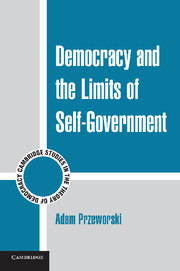Book contents
6 - Agency
Published online by Cambridge University Press: 05 June 2012
Summary
INTRODUCTION
Our institutions are representative. Citizens do not govern; they are governed by others, perhaps different others in turn, but others nevertheless. To assess whether we collectively govern ourselves when we are governed by others, we need to consider two relations: among different parts of the government and between citizens and governments. The structure of government is logically prior to its connection with citizens and it was considered as such. This is because that which citizens can demand or expect of governments depends on what governments can and cannot do. In turn, what they are able to do depends at least to some extent on the way they are organized.
Systems in which different branches of government must consent and cooperate if an action is to be taken are de facto supermajoritarian. By multiplying the number of “veto players,” they privilege the status quo (Tsebelis 2002). Hence, governments may be unable to respond to the will of the majority as expressed in elections, specifically to a mandate for change. The condition of neutrality is violated to varying degrees in almost all democracies by various institutional arrangements that are equivalent to supermajority rules. Indeed, Rae (1971) wanted to measure approximations to the ideal of democracy by the extent to which decision rules deviate from simple majority. Perhaps most noteworthy is the fact that bicameralism is under general conditions equivalent to supermajority rule, a fact already noted by Condorcet (1986 [1787]).
- Type
- Chapter
- Information
- Democracy and the Limits of Self-Government , pp. 125 - 148Publisher: Cambridge University PressPrint publication year: 2010



